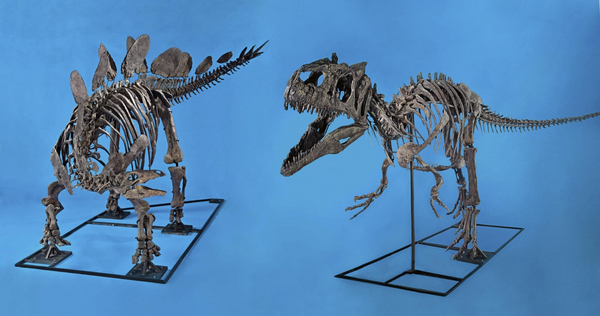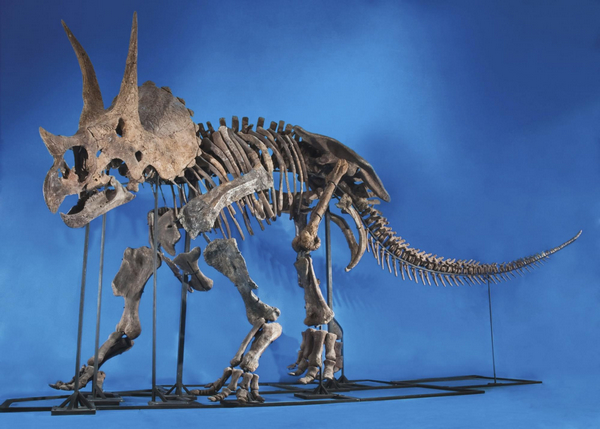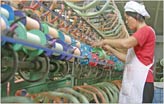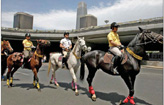Politics
Fighting pair of dinosaur skeletons show Dallas auction
Updated: 2011-06-13 15:11
(Agencies)
DALLAS,United States - Natural history buffs with Tyrannosaurus-sized bank accounts got a chance to ante up on Sunday when an unusually large collection of fully assembled, museum-quality dinosaur skeletons was put up for auction.
The featured stars of the Heritage Auctions bidding were a "fighting pair" of dinosaur skeletons that sold to a museum for $2.75 million, and an enormous, 19-foot-long triceratops that fetched $657,250 from a private collector.
The Dallas auction included more than 200 items, including meteorites, minerals and other fossils.
The fighting dinosaurs -- an allosaurus and a stegosaurus -- were offered together because of their discovery in a Wyoming quarry with the jaw of the allosaurus wrapped around the leg of the stegosaurus, leading to speculation that the two were engaged in a predator-prey battle.
 This handout image shows "The Fighting Pair, Allosaurus and Stegasaurus" that was sold to a museum for $2.75 million on June 12, 2011. The fighting pair, an allosaurus and a stegosaurus, was offered together because of its discovery in a Wyoming quarry with the jaw of the allosaurus wrapped around the leg of the stegosaurus, leading to speculation that the two were engaged in a predator-prey battle. The Dallas auction included more than 200 items, including meteorites, minerals and other fossils.[Photo/Agencies] |
Heritage Auctions declined to disclose which museum picked up the pair, though the organization did say the museum was outside the United States.
"I'm ecstatic that 'the fighting pair' found such a great home," David Herskowitz, director of natural history at Heritage Auctions, said in a statement. "These are important and iconic Jurassic-era specimens, which science did not even know existed together at the same time, and now they will be going to a final destination where the public will get to enjoy them and where they will be of maximum benefit to science."
Collectors and museum benefactors were able to bid in person and online.
Hundreds of people showed up at Dallas' Fair Park to catch a glimpse of the rare and unusually large collection of dinosaur skeletons and other artifacts.
Paul Garner of Dallas came on Sunday with an entourage of family and friends.
"We heard about it from a friend, so we came to look," the day before the auction, he said. "We came back for a second look and with better cameras."
While some specimens were being offered for re-sale, the allosaurus and stegosaurus were on the market for the first time.
 This handout image shows "Virtually Complete Triceratops" a pristine, almost complete triceratops, which was bought for $657,250 on June 12, 2011. [Photo/Agencies] |
Paleontologist Henry Galiano, whose company unearthed the allosaurus and stegosaurus in Wyoming's Dana Quarry in 2007, said the pair was put up for auction to raise money to continue research and the search for new specimens.
Dinosaur skeletons have held the public's fascination since they were first put on display over 150 years ago. Searching for and excavating such fossils is still a tedious, labor-intensive process that has seen little technological advancement since the 19th century, Galiano said.
Yet, interest in the "bones business" is increasing, and there are more expeditions worldwide than ever before.
"I think it was probably the film 'Jurassic Park' that got the public really interested in dinosaurs," Galiano said. Interest was further spurred by the discovery of a Tyrannosaurus rex skeleton, now named Sue, in 1990, he said.
Sue was sold at auction in 1997 for $8.3 million to Chicago's Field Museum of Natural History, Herskowitz said.
Dinosaur skeletons rarely fetch that much and are considered a relative bargain in the world of collectibles, he said. On Sunday, he said, the triceratops skeleton was offered at an opening bid of $500,000.
"Fossils are cheap compared to fine art," he told Reuters. "It's amazing the millions people will spend on fine art."
Specials

Wealth of difference
Rich coastal areas offer contrasting ways of dealing with country's development

Seal of approval
The dying tradition of seal engraving has now become a UNIVERSITY major

Making perfect horse sense
Riding horses to work may be the clean, green answer to frustrated car owners in traffic-trapped cities